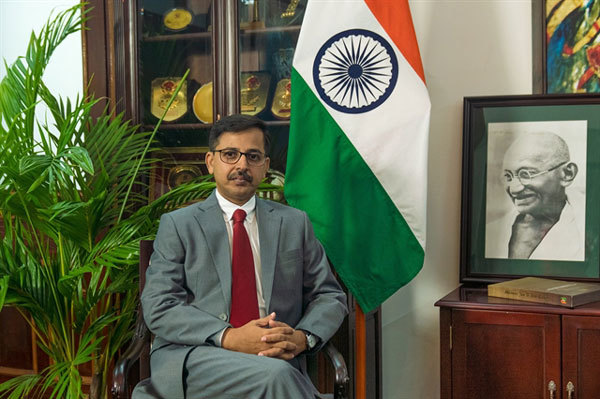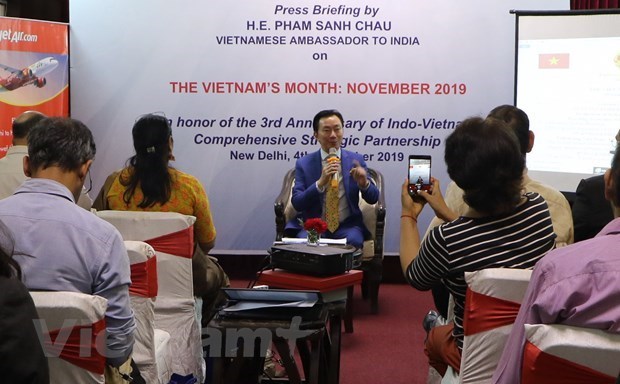 |
| Indian Ambassador Pranay Verma. — Photo courtesy Indian Embassy |
What is your opinion on the economic relationship between Vietnam and India?
Economic and commercial ties are an important pillar of the Comprehensive Strategic Partnership between India and Vietnam. There has been steady growth in bilateral economic engagement over the years. From a meagre US$200 million in 2000, our bilateral trade has grown to nearly $13 billion in 2019. India is today Vietnam’s seventh largest trading partner. For India, Vietnam is the fourth largest trading partner in ASEAN. As two fast growing economies and countries aspiring for deeper integration with world and regional economies, there is a huge potential for our economic engagement waiting to be tapped.
How do you rate the investment from India to Vietnam and vice versa?
According to official statistics, based on invested capital, Indian investment in Vietnam as of 2019 is close to $925 million. If you include Indian investment coming through third countries, then this number grows to nearly $2 billion. Indian companies have invested in Vietnam mostly in the areas of energy, mineral exploration, agro-processing, agro-chemicals, IT and auto components. In comparison, Vietnamese investments in India are modest at currently around $30 million, covering areas such as pharmaceuticals, building materials and chemicals. We are encouraging businesses in Vietnam to look at India as a preferred investment destination.
In what areas do you think India can invest more in Vietnam?
Given India’s capabilities and Vietnam’s priorities, Indian companies are looking to invest in Vietnam in sectors, like energy, including renewable energy, IT, pharmaceuticals, infrastructure development and the automotive industry, etc.
How can India and Vietnam promote trade during the Covid-19 epidemic?
Covid-19 has disrupted established supply chains for manufacturers based in both India and Vietnam. As we deal with this challenge, there is also an opportunity for our businesses to explore alternative supply chains located in each other’s country. As a large economy, India is willing to step forward and plug some of the supply chain gaps for our partner countries. These open up new opportunities. For example, in areas like agro-products, textile and garments, machinery, etc., suppliers and manufactures in India and Vietnam can establish new partnerships to diversify their supply chains.
India has a big and growing start-up community and a number of unicorns. Vietnam also wants to develop its start-ups. What can Vietnam learn from Indian experience? Is there some potential cooperation between start-up communities of the two sides?
India has one of the world’s largest start-up ecosystems driving technology and innovation, attracting new investments and generating tens of thousands of direct jobs. According to our industry estimates, India today hosts nearly 9,000 start-ups with 24 unicorns valued at over $1 billion. The government of India’s ‘Start-up India’ mission has been proactively creating an enabling environment for development of start-ups and harnessing the large pool of talent with innovative ideas. Vietnam, too, is increasingly focused on innovation to improve productivity, and its start-up industry is well-recognised. This is certainly an area of significant potential where we may learn from each other’s experiences, policies and enabling environments, as well as explore collaborative partnerships in areas such as IT services, e-commerce, fintech, healthcare services, logistics, etc.
How is India supporting Southeast Asian countries, including Vietnam?
India has announced a concessional line of credit of $1 billion for ASEAN countries to develop connectivity infrastructure, both physical and digital connectivity, as part of our commitment to seek closer integration with ASEAN. Connectivity is an important dimension of India’s Act East Policy and the Indo-Pacific vision. It is also a priority under ASEAN’s Outlook on Indo-Pacific. Connectivity therefore provides a strong basis for cooperation between India and Vietnam, as well as other ASEAN partners, to promote closer economic cooperation, seek shared prosperity and enhance people-to-people exchanges.
What are your expectations for economic development between the two sides?
I am very optimistic about the prospects of our economic partnership. As two fast growing economies and as two youthful and aspiring societies, there is a huge potential for our economic engagement. As India strives to become a $5 trillion economy, the demands and capacities it would generate will offer significant economic opportunities for partners like Vietnam.
We are proactively focused on enhancing the economic dimensions of our engagement, with regular visits of officials and business delegations taking place in both directions. Our Embassy in Hanoi and Consulate in HCM City are constantly at work to bring our business communities closer together and help them explore new opportunities. The recent launch of direct flights between our two countries is another positive development that will hopefully encourage businesses on both sides to work on their complementarities and push the level of our economic ties. — VNS

Vietnam's Month to be held in India
The Vietnamese Embassy in India held a press conference on November 4 to announce the Vietnam's Month with dozens of events in localities nationwide to further reinforce bilateral ties.

India opens investigation into steel imports from Vietnam
India’s Directorate General of Trade Remedies (DGTR) has initiated an investigation on potential anti-dumping duties against imported flat rolled stainless steel products from 15 countries and territories including Vietnam.
 Indian Ambassador Pranay Verma speaks to Việt Nam News about business opportunities between Vietnam and India in the context of the Covid-19 epidemic.
Indian Ambassador Pranay Verma speaks to Việt Nam News about business opportunities between Vietnam and India in the context of the Covid-19 epidemic.